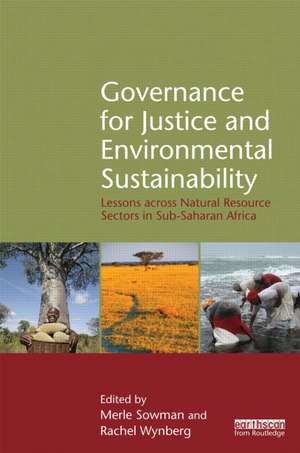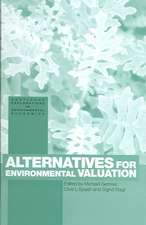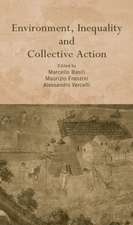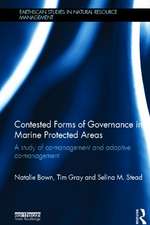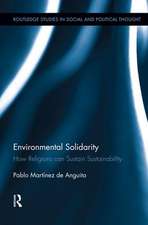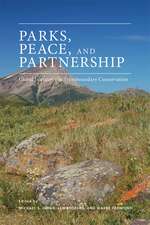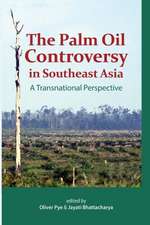Governance for Justice and Environmental Sustainability: Lessons across Natural Resource Sectors in Sub-Saharan Africa
Editat de Merle Sowman, Rachel Wynbergen Limba Engleză Hardback – 11 feb 2014
This book is concerned with enhancing the understanding of governance in relation to social justice and environmental sustainability across a range of natural resource sectors in Sub-Saharan Africa. By examining governance across various sectors, it reveals the main drivers that influence the nature of governance, the principles and norms that shape it, as well as the factors that constrain or enable achievement of justice and sustainability outcomes. The book also illuminates the complex relationships that exist between various governance actors at different scales, and the reality and challenge of plural legal systems in much of Sub-Saharan Africa.
The book comprises 16 chapters, 12 of them case studies recounting experiences in the forest, wildlife, fisheries, conservation, mining and water sectors of diverse countries: Madagascar, Zimbabwe, Botswana, Namibia, South Africa, Zambia, Mozambique, Sierra Leone and Cameroon.Through insights from these studies, the book seeks to draw lessons from the praxis of natural resource governance in Sub-Saharan Africa and to contribute to debates on how governance can be strengthened and best configured to meet the needs of the poor, in a way that is both socially just and ecologically sustainable.
| Toate formatele și edițiile | Preț | Express |
|---|---|---|
| Paperback (1) | 338.33 lei 6-8 săpt. | |
| Taylor & Francis – 21 apr 2016 | 338.33 lei 6-8 săpt. | |
| Hardback (1) | 827.40 lei 6-8 săpt. | |
| Taylor & Francis – 11 feb 2014 | 827.40 lei 6-8 săpt. |
Preț: 827.40 lei
Preț vechi: 1107.18 lei
-25% Nou
Puncte Express: 1241
Preț estimativ în valută:
158.33€ • 169.30$ • 132.01£
158.33€ • 169.30$ • 132.01£
Carte tipărită la comandă
Livrare economică 17 aprilie-01 mai
Preluare comenzi: 021 569.72.76
Specificații
ISBN-13: 9780415523592
ISBN-10: 0415523591
Pagini: 384
Ilustrații: 36 black & white illustrations, 12 black & white tables
Dimensiuni: 156 x 234 x 25 mm
Greutate: 0.87 kg
Ediția:1
Editura: Taylor & Francis
Colecția Routledge
Locul publicării:Oxford, United Kingdom
ISBN-10: 0415523591
Pagini: 384
Ilustrații: 36 black & white illustrations, 12 black & white tables
Dimensiuni: 156 x 234 x 25 mm
Greutate: 0.87 kg
Ediția:1
Editura: Taylor & Francis
Colecția Routledge
Locul publicării:Oxford, United Kingdom
Public țintă
Postgraduate and ProfessionalCuprins
1. Introduction 2. Governance for Justice and Environmental Sustainability: Theories and Concepts 3. Localising Global Environmental Governance Norms: Implications for Justice 4. Governing Ancestral Land in Madagascar: Have Policy Reforms Contributed to Social Justice? 5. Exclusionary Spaces: Power, Poverty and Community-based Natural Resource Management in West Africa 6. Wildlife Paying Its Way? A Critical Analysis of Community-based Natural Resource Management in the Chobe Enclave, Botswana 7. Community-based Conservation and Protected Areas: Commons Perspectives for Promoting Biodiversity and Social Justice in Southern Africa 8. Community-based Natural Resource Management: Micro-Governance and Face-to-Face Participatory Democracy 9. Fisheries Co-Management in the Okavango Delta’s Panhandle: The Okavango Fisheries Management Committee Case Study 10. Shifting Gear: A New Governance Framework for Small-Scale Fisheries in South Africa 11. Legal Pluralism and the Governance of Freshwater Resources in Southern Africa: Can Customary Governance be Embedded Within the Statutory Frameworks for Integrate Water Resources Management? 12. Customary Governance of Baobab in Eastern Zimbabwe: Impacts of State-led Interventions 13. Partnerships Are Not Forever: The Limits of Collaborative Governance in Diamond Mining in Namaqualand 14. Governance, Equity, and Sustainability in Non-Timber Forest Product Value Chains 15. Governing the Ungovernable? Climate Change and Social Justice in Southern Africa 16. Towards Robust Governance for Justice and Environmental Sustainability: Lessons from Natural Resource Sectors in Southern Africa
Notă biografică
Merle Sowman is the Director of the Environmental Evaluation Unit and Associate Professor in the Department of Environmental and Geographical Science at the University of Cape Town (UCT), South Africa.
Rachel Wynberg is Deputy Director of the Environmental Evaluation Unit and Associate Professor in the Department of Environmental and Geographical Science at the University of Cape Town (UCT), South Africa, where she holds a Research Chair on Social and Environmental Dimensions of the Bio-economy.
Rachel Wynberg is Deputy Director of the Environmental Evaluation Unit and Associate Professor in the Department of Environmental and Geographical Science at the University of Cape Town (UCT), South Africa, where she holds a Research Chair on Social and Environmental Dimensions of the Bio-economy.
Recenzii
"Resource governance at its best. Sowman, Wynberg and colleagues have produced a book with strong theory and fascinating case studies that provide a broad vista across the sub-Saharan African landscape and waterscape." – Fikret Berkes, Natural Resource Institute, University of Manitoba, Canada.
"This book is at the cutting edge of the quest for sustainable development solutions that acknowledge the central place of social justice in the political and governance domains. This is a book that should be read and used by development practitioners and scholars, with valuable insights from Africa for the world." – Bruce Frayne, Associate Professor, University of Waterloo, Canada.
"This book is at the cutting edge of the quest for sustainable development solutions that acknowledge the central place of social justice in the political and governance domains. This is a book that should be read and used by development practitioners and scholars, with valuable insights from Africa for the world." – Bruce Frayne, Associate Professor, University of Waterloo, Canada.
Descriere
This book focuses on consolidating and enhancing intellectual understanding, knowledge and capacity about governance systems required to achieve justice and environmental sustainability, with a particular focus on Sub-Saharan Africa.
